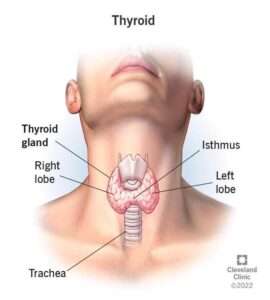Thyroid

In Ayurveda, the thyroid gland, referred to as “Jatru granthi,” holds significance in the intricate web of bodily functions. The term “Jatru” specifically points to the collarbone, emphasizing the location of this crucial gland. “Granthi” translates to gland, highlighting the thyroid’s role in regulating metabolism through hormone production.
The thyroid gland produces three essential hormones that play pivotal roles in the body’s metabolic processes: T4 (Thyroxin), T3 (Triiodothyronine), and Calcitonin. The brain, acting through TSH (Thyroid Stimulating Hormone), meticulously orchestrates the secretion of these hormones. TSH acts as the messenger, instructing the thyroid gland to release T3 and T4. These hormones are indispensable for the harmonious functioning of cellular activities, ensuring the metabolism of each cell is finely tuned.
Thyroid disorders encompass conditions affecting the thyroid gland’s structure or function, categorized into hypothyroidism, characterized by insufficient thyroid hormone production, and hyperthyroidism, marked by excess hormone production. Hypothyroidism symptoms include fatigue, weight gain, and depression, while hyperthyroidism manifests as weight loss, rapid heart rate, and anxiety. Thyroid nodules and thyroiditis, inflammation of the thyroid, also contribute to thyroid disorders. Although often manageable with medication and lifestyle adjustments, some cases may require surgical intervention. Regular monitoring, diagnosis through blood tests and imaging, and medical supervision are crucial for effective management of thyroid disorders, ensuring optimal thyroid hormone balance and overall well-being.
While Ayurvedic literature may not explicitly detail thyroid diseases, Ayurveda provides holistic methodologies, particularly through Panchakarma therapies, to address and manage thyroid-related disorders. The emphasis lies in restoring balance to the body’s systems, acknowledging the interconnectedness of physical, mental, and emotional well-being. This holistic approach, deeply rooted in Ayurvedic principles, contributes valuable insights into maintaining thyroid function and fostering overall health and vitality. The discussion further delves into the specific nuances of hypothyroidism and hyperthyroidism, offering comprehensive perspectives on Ayurvedic management strategies.
Hypothyroidism
Lower T3, Lower T4 levels
Hyperthyroidism
Higher T3, Higher T4 levels
